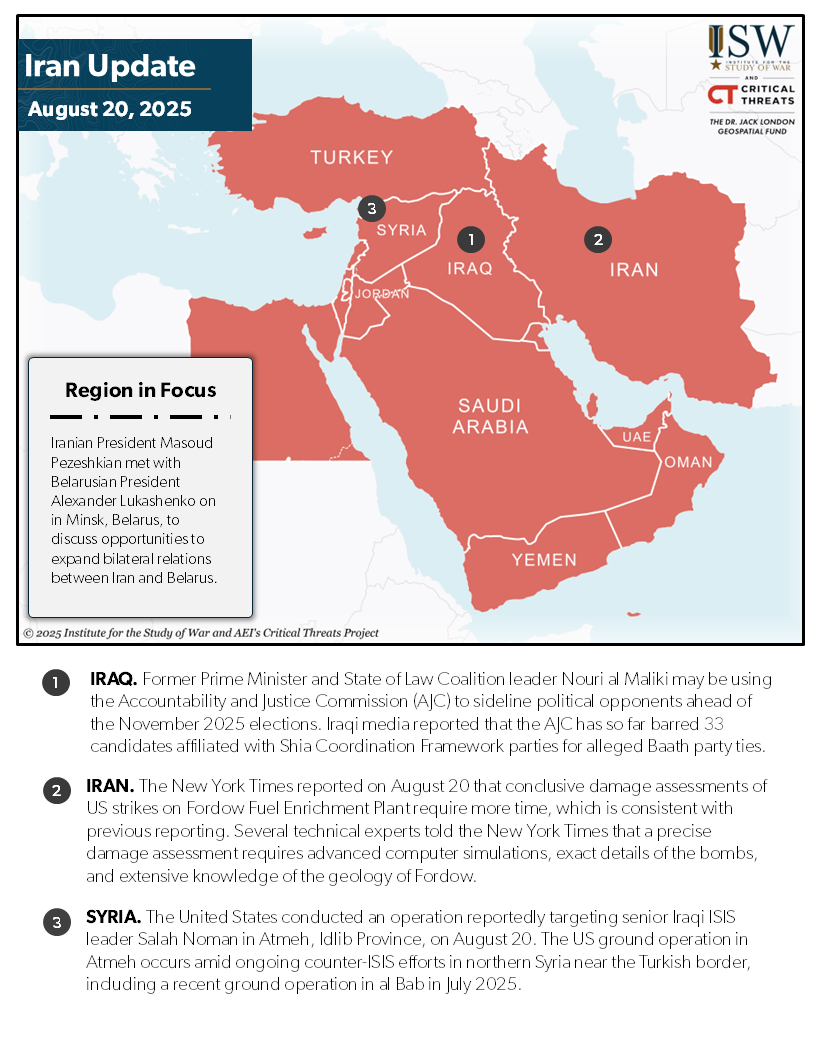Former Prime Minister and State of Law Coalition leader Nouri al Maliki may be using the Accountability and Justice Commission (AJC) to sideline political opponents ahead of the November 2025 elections. Iraqi media reported on August 20 that the AJC has so far barred 33 candidates affiliated with Shia Coordination Framework parties for alleged Baath party ties. The Shia Coordination Framework is a loose coalition of Shia political parties, some of which Iran backs. The AJC reportedly barred eight members of Asaib Ahl al Haq’s Sadiqoun Movement, seven Badr Organization candidates, five members of Kataib Hezbollah’s Hoquq Movement, six members of the Imam Ali Brigade’s Services Alliance, the head of Kataib Sayyid al Suhahda in Kirkuk, one member of Prime Minister Mohammad Shia al Sudani’s Reconstruction and Development bloc, and three candidates from Labor Minister Ahmed al Asadi’s Jund al Samaa bloc. Asadi is aligned with Sudani. Shia political parties, but particularly Maliki, previously used the AJC ahead of elections in 2010 to bar candidates opposed to him, and could be weaponizing the commission again. It is highly unlikely that seven Badr Organization members, for example, have real Baathist ties due to Badr’s history. Badr Organization is the rebranded Badr Corps. The Iranian Islamic Revolutionary Guards Corps (IRGC) founded the Badr Corps as an Iraqi Shia formation to fight Saddam Hussein’s Iraqi Army during the Iran-Iraq War. The AJC only excluded three candidates aligned with Maliki for suspected Baath party ties, according to leaked documents published by Iraqi media on August 13. Candidates from political parties and coalitions that are competing with Maliki’s State of Law Coalition, meanwhile, constitute a disproportionate number of those barred due to alleged Ba'ath party links. This report comes after Maliki’s Dawa Party released a statement on August 13 affirming its support for the Commission’s measures. Maliki also emphasized on August 8 the need for the AJC to take action against Baathists. Former Prime Minister Haider al Abadi, once a member of Maliki’s former Dawa Party, criticized on August 20 the weaponization of the AJC for political purposes. Shia political parties, particularly Maliki, have long manipulated the Accountability and Justice Commission to target political opponents.
The New York Times reported on August 20 that conclusive damage assessments of US strikes on Fordow Fuel Enrichment Plant require more time, which is consistent with previous reporting. The United States dropped twelve 30,000lb GBU-57 bunker buster bombs on Fordow in June 2025, targeting ventilation shafts at the site that led to a centrifuge cascade hall located at least 250 feet underground. An unspecified US Department of Defense official said that the United States aimed to destroy the centrifuges with shock waves and other effects of the blasts because the bombs would probably not make direct contact with the centrifuge chamber itself. International Atomic Energy Agency Director Rafael Grossi previously stated that the Fordow centrifuges are “no longer working” and emphasized that even small vibrations can destroy them. The US bombs would have generated a blast wave far more significant than small vibrations. Several technical experts told the New York Times that a precise damage assessment requires advanced computer simulations, exact details of the bombs, and extensive knowledge of the geology of Fordow. Iranian officials have emphasized that Iran cannot access the nuclear sites struck by US and Israeli airstrikes yet, which also prevents conclusive battle damage assessments.
Iran is deepening its economic and military cooperation with Belarus. Iranian President Masoud Pezeshkian met with Belarusian President Alexander Lukashenko on August 20 in Minsk, Belarus, to discuss opportunities to expand bilateral relations. Pezeshkian stated that Iran and Belarus share common interests and want to combat US and European efforts to ”push unilateralism” in the region. Pezeshkian emphasized that both countries can cooperate to mitigate the effects of international sanctions. Iranian and Belarusian officials signed 12 memorandums of understanding (MoU) focused on increasing bilateral trade, military-tech cooperation, and mutual investment during Pezeshkian’s visit. Iranian Minister of Foreign Affairs Abbas Araghchi stated on August 20 that Iran plans to sign a comprehensive strategic partnership with Belarus. Iran and Belarus have increased defense and security cooperation over the past few years. Iran showcased military equipment at a Belarusian military exhibit in May 2025. Iran has reportedly worked to establish a drone factory in Belarus since May 2023 to support the Russian invasion of Ukraine. | 




 [ISW] 러시아 공세 캠페인 평가, 2025년 8월 20일
[ISW] 러시아 공세 캠페인 평가, 2025년 8월 20일
 [ISW] 적국 협상 태스크포스 업데이트, 2025년 8월 13일
[ISW] 적국 협상 태스크포스 업데이트, 2025년 8월 13일